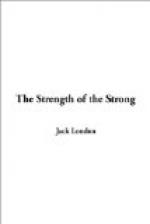SAMUEL
Margaret Henan would have been a striking figure under any circumstances, but never more so than when I first chanced upon her, a sack of grain of fully a hundredweight on her shoulder, as she walked with sure though tottering stride from the cart-tail to the stable, pausing for an instant to gather strength at the foot of the steep steps that led to the grain-bin. There were four of these steps, and she went up them, a step at a time, slowly, unwaveringly, and with so dogged certitude that it never entered my mind that her strength could fail her and let that hundred-weight sack fall from the lean and withered frame that wellnigh doubled under it. For she was patently an old woman, and it was her age that made me linger by the cart and watch.
Six times she went between the cart and the stable, each time with a full sack on her back, and beyond passing the time of day with me she took no notice of my presence. Then, the cart empty, she fumbled for matches and lighted a short clay pipe, pressing down the burning surface of the tobacco with a calloused and apparently nerveless thumb. The hands were noteworthy. They were large-knuckled, sinewy and malformed by labour, rimed with callouses, the nails blunt and broken, and with here and there cuts and bruises, healed and healing, such as are common to the hands of hard-working men. On the back were huge, upstanding veins, eloquent of age and toil. Looking at them, it was hard to believe that they were the hands of the woman who had once been the belle of Island McGill. This last, of course, I learned later. At the time I knew neither her history nor her identity.
She wore heavy man’s brogans. Her legs were stockingless, and I had noticed when she walked that her bare feet were thrust into the crinkly, iron-like shoes that sloshed about her lean ankles at every step. Her figure, shapeless and waistless, was garbed in a rough man’s shirt and in a ragged flannel petticoat that had once been red. But it was her face, wrinkled, withered and weather-beaten, surrounded by an aureole of unkempt and straggling wisps of greyish hair, that caught and held me. Neither drifted hair nor serried wrinkles could hide the splendid dome of a forehead, high and broad without verging in the slightest on the abnormal.
The sunken cheeks and pinched nose told little of the quality of the life that flickered behind those clear blue eyes of hers. Despite the minutiae of wrinkle-work that somehow failed to weazen them, her eyes were clear as a girl’s—clear, out-looking, and far-seeing, and with an open and unblinking steadfastness of gaze that was disconcerting. The remarkable thing was the distance between them. It is a lucky man or woman who has the width of an eye between, but with Margaret Henan the width between her eyes was fully that of an eye and a half. Yet so symmetrically moulded was her face that this




